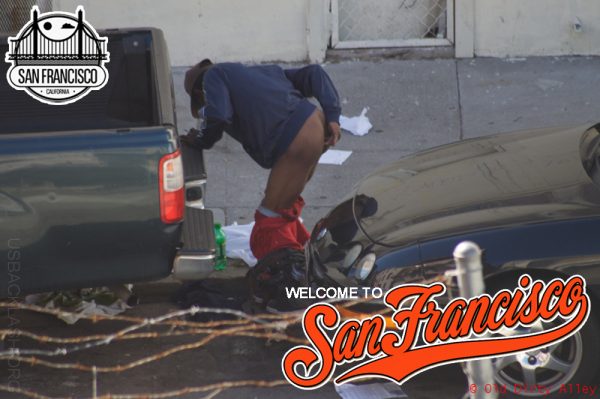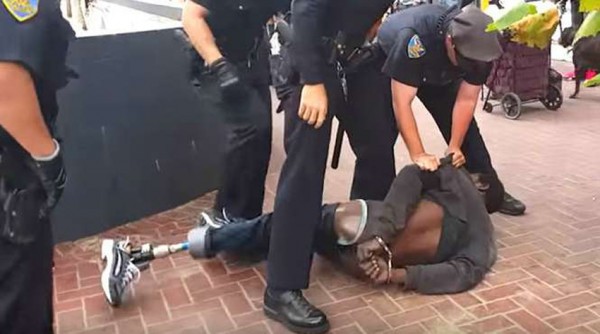San Francisco should be totally ashamed of the way that they are sweeping their homeless community under the rug to try and hide the fact that San Francisco has a horrible homeless problem that they will do nothing about – unless there is a big football game, of course.

San Francisco Sweeps Homeless Community Under Rug To Hide Shameful Homeless Problem From Super Bowl Fans & TV Cameras
Homeless people living on the streets of San Francisco have been ignored and forgotten for years by a city filled with deviants and AIDS patients, but hey, now that the Super Bowl is coming to town, the San Francisco Mayor Ed Lee now miraculously wants to do something “to help” the homeless people living there. He wants to sweep them under the run to hide San Fransicko’s homeless from football fans and ESPECIALLY from the TV cameras covering the game.
San Francisco doesn’t want the world to know that there are around 15,000 homeless living in their city – shitting and pissing all over everything in sight.
RELATED: Deviant-Filled San Fransicko Smells Like Piss So Much They Are Testing Pee-Repellant Paint
The so-called “leaders” in San Fransicko will always say that “Homeless is going down”, but that is just a lie that they tell outsiders, but people who live in San Fransicko know the despicable truth that the city’s “leaders” want to hide from the world.
When guests asked the owner of the Handlery Hotel about San Fransicko’s visibly horrible and despicable homeless problem, he said “I used to lie. I used to say, ‘San Francisco is like many cities — we have challenges with the panhandlers, but they’re working on it’ – Now I say, ‘Unfortunately, the city hasn’t found a way to solve the problem.’”
San Francisco Mayor Ed Lee has promised to sweep the city’s downtown streets of its booming homeless population by the time the Super Bowl comes to town in early 2016.
“They are going to have to leave,” Lee told local news station KPIX earlierthis week. “We’ll give you an alternative, we are always going to be supportive, but you are going to have to leave the streets.”
Lee has promised to move some of the homeless population into 500 housing units ahead of the big game. Homeless advocates in the city say that there are already many people living in those units and point out that the number is far too small to accommodate the needy.
The mayor said the police will be involved in the crackdown and are already getting the message out to those living on the streets this summer and fall. Though Lee has faced criticism from some homeless outreach groups, others in the city have cheered him for tackling a problem they see as getting worse.
The mayor’s office did not return multiple requests for comment from VICE News.
The crackdown comes amid growing concern about homelessness in cities across the country, including a much-publicized campaign by the New York Police Department to snap photos of homeless people sleeping, begging, or urinating in public places and post them to Flickr as a way of urging city officials to do something about the blight.
Josh Leopold, a research associate in the Metropolitan Housing and Communities Policy Center at the Urban Institute, told VICE News that there has been no significant uptick in the actual number of homelessness in the country, though there may be some fluctuations in certain cities. San Francisco isn’t one of them, he noted.
“The long term trend is that homelessness is going down, specifically chronic homelessness, the long term homeless with disabilities on the streets,” he said. “That has been decreasing.”
‘He’s not trying to end homelessness. He’s stating he wants to clear people for a Super Bowl party that is going to take place in the main area of commerce in San Francisco.’
Jennifer Friedenbach, director of the city’s Coalition on Homelessness, said that the number of homeless on the streets at last count was around 6,000, which is relatively stable compared to other years. She added that people in such unfortunate circumstances can rapidly develop health difficulties that exacerbate their predicament.
“As people are staying homeless longer, their disabilities become worse, their mental health deteriorates really quickly, their episodes become a lot more debilitating and more frequent, and their physical health is deteriorating pretty quickly,” Friedenbach told VICE News. “Things that are small when you’re housed turn into major problems when you’re homeless.”
Rather than using police to clean up the streets for the Super Bowl, Friedenbach thinks the mayor should invest in real housing solutions in a city where rents have skyrocketed over the past decade, squeezing out lower-income residents. The median cost of renting an apartment in the city is $3,880 a month.
“There’s no need to do a massive sweep of people before an event and displace people who have nowhere else to go in this very orchestrated police effort,” Friedenbach said.
She and Leopold said that if the city relies on police to deal with the problem by issuing citations or clogging up jails, this effort could produce heavy residual costs for the city and its homeless population. If an individual cannot pay the fine for a minor offense, a warrant can be issued, resulting in court fees or jail time while burdening the city’s justice system. A string of missed court dates and late fees on unpaid tickets can quickly compound costs. A criminal warrant can also reduce a homeless person’s ability to qualify for public housing.
“This is a mayor who’s really backed off his commitment to housing,” Friedenbach remarked. “He’s not trying to end homelessness. He’s stating he wants to clear people for a Super Bowl party that is going to take place in the main area of commerce in San Francisco.”
While New York and San Francisco have struggled to deal effectively with homelessness, some cities elsewhere in the country have effectively reduced their homeless populations, Leopold said. Places like New Orleans and Salt Lake City have used outreach efforts, in which advocates distribute blankets and supplies to the homeless, to collect vast amounts of data that have helped officials work to house the needy.
“They have collected really good data on who the long-term homeless living on the streets are, what kind of medical conditions do they have, what’s their risk that they’re going to die prematurely on streets if they don’t get into housing,” Leopold said. “They’ve used that information to prioritize people to get them into supportive housing.”
He also pointed to a program in New York where the city and state are focusing on “discharge planning,” or ways to help people who are exiting psychiatric institutions or jails to avoid ending up on the street.
“They try to shut down that revolving door,” he said.
Even day-to-day interactions between city officials and the homeless can help solve the problem. Houston has paired police officers with mental health professionals to do homeless outreach, so that the officers can learn from those who have training with mental illness to help people with severe problems.
Stand Up To Government Corruption and Hypocrisy – usbacklash.org

